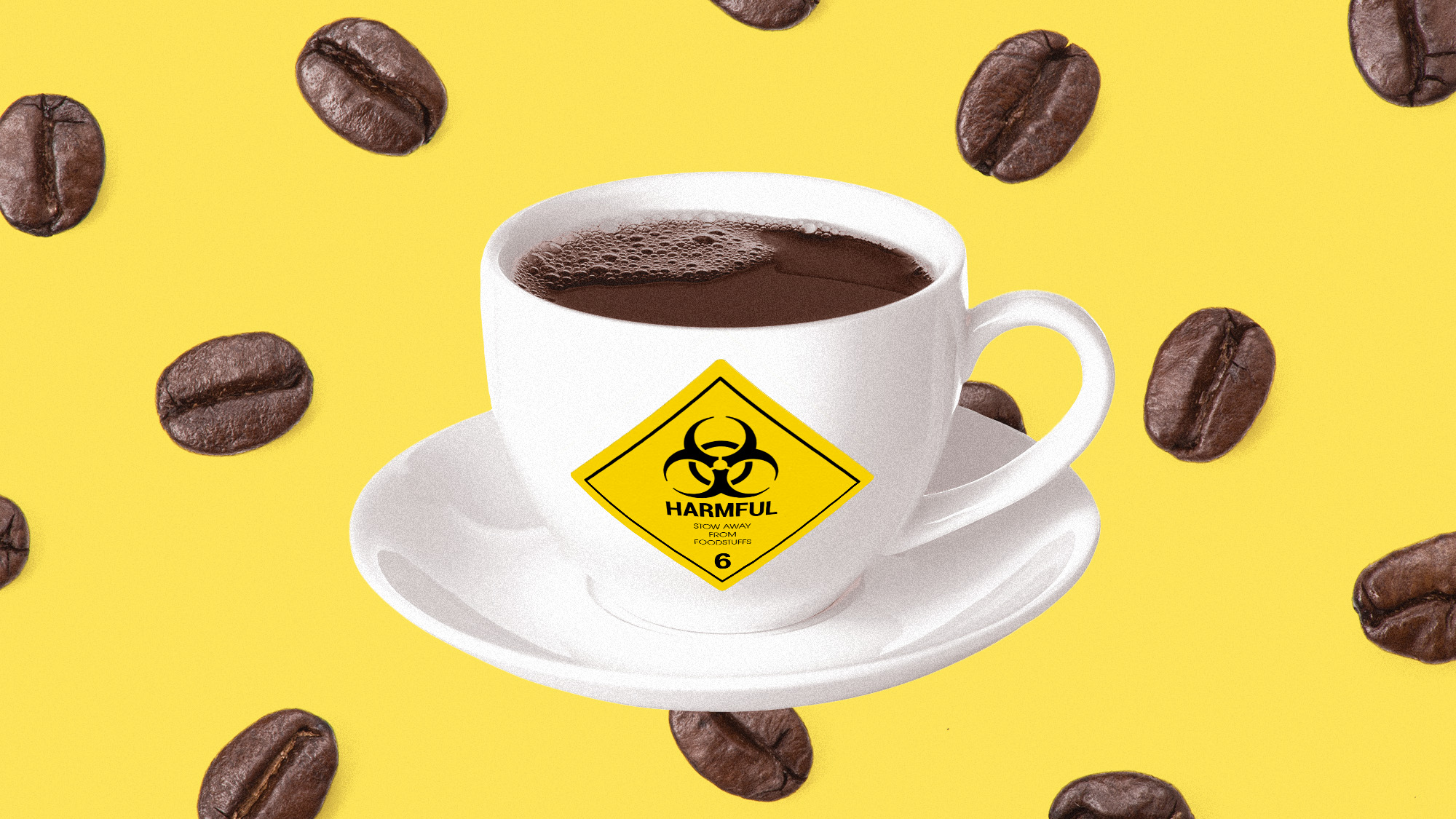The push to ban decaf coffee
Going caffeine-free can be risky


A free daily email with the biggest news stories of the day – and the best features from TheWeek.com
You are now subscribed
Your newsletter sign-up was successful
If you love a cup of joe but don't want the jitters, decaffeinated coffee is probably your go-to. Unfortunately, some health experts are concerned that the process required to remove caffeine from the brew could be increasing people's risk of cancer. The process uses a chemical called methylene chloride, which is a known carcinogen. Advocacy groups are pushing to have the chemical banned while government experts claim that the amount of the solvent used in the process is negligible and carries no serious risk to a person's health.
Minus caffeine, plus chemicals
Coffee beans naturally contain caffeine, a stimulant that many use to combat fatigue. In order to create decaffeinated coffee, the caffeine must be removed from the bean using a chemical process. Many varieties of decaf coffee are made with the European Method of Decaffeination, which "starts by boiling coffee beans and then soaking the softened beans in chemicals such as methylene chloride or ethyl acetate," said Food & Wine. Methylene chloride, which is "used in various industrial processes, in many different industries including paint stripping, pharmaceutical manufacturing, paint remover manufacturing and metal cleaning and degreasing," poses the most health risk, said the U.S. Occupational Safety and Health Administration.
Methylene chloride is a confirmed carcinogen and "can cause other health harms, such as liver toxicity and at higher exposures neurological effects, and in some cases death," Dr. Maria Doa, the senior director of chemical policy for the Environmental Defense Fund, said to CNN. The dangers of the chemical have been well-documented and even led the Environmental Protection Agency (EPA) to ban its sale as a paint stripper in 2019. The EPA went further in 2024, banning the use of the chemical in most cases. Despite this, the Food and Drug Administration (FDA) has not banned the chemical, instead placing limitations on its use. "While methylene chloride may be indirectly involved in food processing, such as in the decaffeination of coffee beans, residue limits have been set to limit exposure," an FDA spokesperson said in an email to CNN. "Any food product that contains residues of methylene chloride above the established limits are not permitted for sale or consumption."
The Week
Escape your echo chamber. Get the facts behind the news, plus analysis from multiple perspectives.

Sign up for The Week's Free Newsletters
From our morning news briefing to a weekly Good News Newsletter, get the best of The Week delivered directly to your inbox.
From our morning news briefing to a weekly Good News Newsletter, get the best of The Week delivered directly to your inbox.
The buzz to ban
Despite the FDA's claim that the levels of methylene chloride in decaf coffee do not pose a health risk, many advocacy groups disagree. "There is more information on the toxicity of methylene chloride and the levels at which it causes this toxicity," Doa said. "This information as well as more recent information on how much coffee we drink — just consider the different sizes now available at coffee shops — are key to developing a current picture of how much of a risk the residual methylene chloride could present."
The opposing groups are pushing for the FDA to restrict methylene chloride, specifically citing that the agency is violating a 1958 rule called the Delaney Clause by allowing for its use in creating decaf coffee. The clause requires the FDA to "ban food additives which are found to cause or induce cancer in humans or animals as indicated by testing," said the U.S. Government Accountability Office. The agency filed a petition from the advocacy groups in January 2024 proposing that "solvents including methylene chloride, benzene, ethylene dichloride and trichloroethylene be prohibited or restricted in American food and drugs," said STAT News, as all of these have proven to be carcinogenic.
This, however, does not spell the end of decaf coffee. The European Method is not the only way to decaffeinate coffee beans. Two other methods — the CO2 decaffeination process and the Swiss Water method — are becoming more popular and do not require the use of toxic chemicals. These processes have not been as widely used because the coffee industry claims they are "less effective," "more expensive," and can "lead to lower-quality coffee," STAT News said.
Many decaf coffee brands do label their packaging with the decaffeination method used, so customers can stay informed. "As a consumer, always do your research," Monique Richard, a registered dietitian nutritionist and owner of Nutrition-In-Sight, said to CNN. "Look up what you can about the company. Ask those questions if you can get on a customer hotline on their website."
A free daily email with the biggest news stories of the day – and the best features from TheWeek.com
Devika Rao has worked as a staff writer at The Week since 2022, covering science, the environment, climate and business. She previously worked as a policy associate for a nonprofit organization advocating for environmental action from a business perspective.
-
 Why are election experts taking Trump’s midterm threats seriously?
Why are election experts taking Trump’s midterm threats seriously?IN THE SPOTLIGHT As the president muses about polling place deployments and a centralized electoral system aimed at one-party control, lawmakers are taking this administration at its word
-
 ‘Restaurateurs have become millionaires’
‘Restaurateurs have become millionaires’Instant Opinion Opinion, comment and editorials of the day
-
 Earth is rapidly approaching a ‘hothouse’ trajectory of warming
Earth is rapidly approaching a ‘hothouse’ trajectory of warmingThe explainer It may become impossible to fix
-
 Scientists are worried about amoebas
Scientists are worried about amoebasUnder the radar Small and very mighty
-
 Metal-based compounds may be the future of antibiotics
Metal-based compounds may be the future of antibioticsUnder the radar Robots can help develop them
-
 A Nipah virus outbreak in India has brought back Covid-era surveillance
A Nipah virus outbreak in India has brought back Covid-era surveillanceUnder the radar The disease can spread through animals and humans
-
 Deaths of children under 5 have gone up for the first time this century
Deaths of children under 5 have gone up for the first time this centuryUnder the radar Poor funding is the culprit
-
 A fentanyl vaccine may be on the horizon
A fentanyl vaccine may be on the horizonUnder the radar Taking a serious jab at the opioid epidemic
-
 Nitazene is quietly increasing opioid deaths
Nitazene is quietly increasing opioid deathsThe explainer The drug is usually consumed accidentally
-
 More adults are dying before the age of 65
More adults are dying before the age of 65Under the radar The phenomenon is more pronounced in Black and low-income populations
-
 Scientists have developed a broad-spectrum snake bite antivenom
Scientists have developed a broad-spectrum snake bite antivenomUnder the radar It works on some of the most dangerous species
